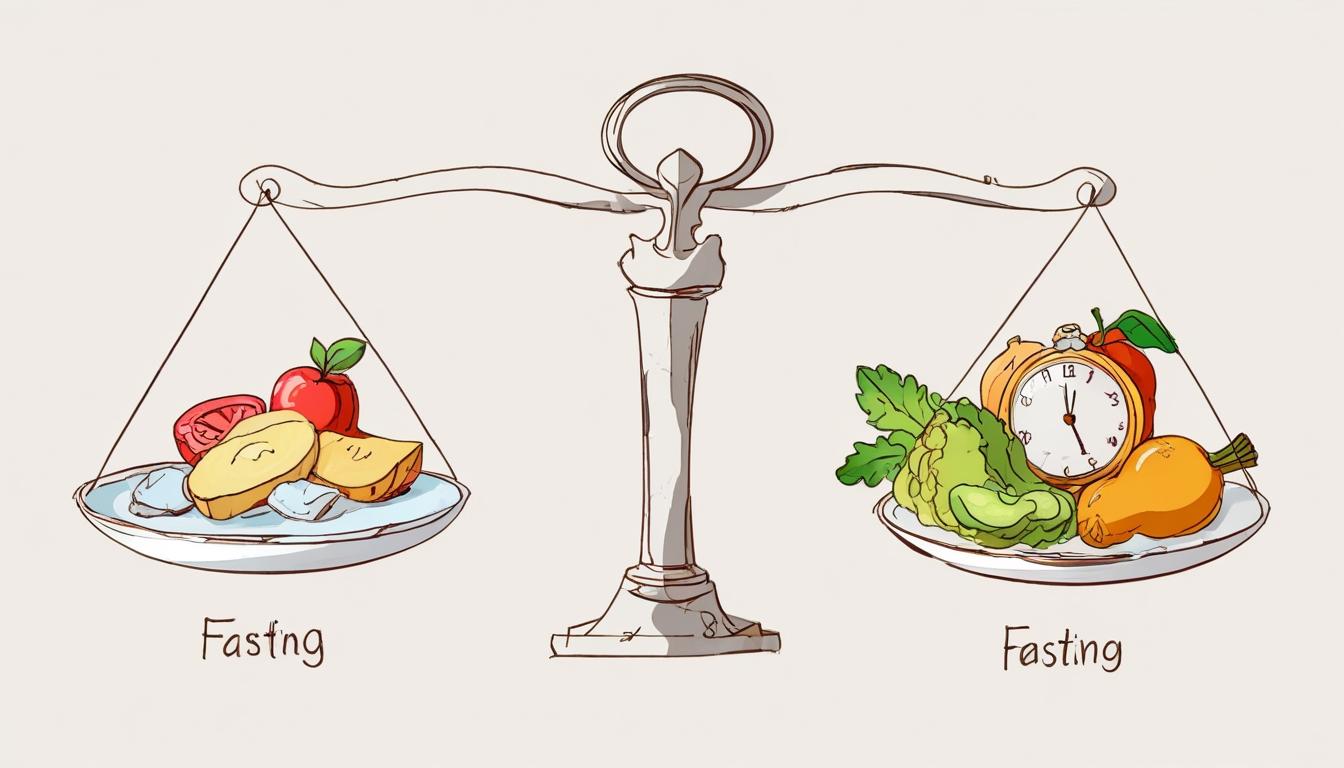A study reveals that intermittent fasting could promote greater weight loss than calorie-restricted diets, while a UK trial advocates for gastric bypass surgery as the key obesity treatment.
Research from the University of Colorado Anschutz Medical Campus has indicated that intermittent fasting, specifically a three-day-a-week regimen, may be more effective for weight loss compared to standard calorie-restricted diets. Over a year, participants practicing intermittent fasting lost an average of 7.6 per cent of their body mass, while those on a daily calorie-restricted diet saw a loss of around 5 per cent. This study, published in the Annals of Internal Medicine, involved 165 adults classified as overweight or obese.
The intermittent fasting group, referred to as the 4:3 group, reduced their caloric intake by 80 per cent on fasting days, with an unrestricted diet on the other days, albeit with encouragement to choose healthy options. Meanwhile, the calorie-restricted group aimed for a daily energy deficit of 34.3 per cent. Despite both groups targeting equivalent weekly caloric deficits, the intermittent fasters exhibited a more significant weight reduction. Dropout rates were also lower in the fasting group, at just under 20 per cent compared to nearly 30 per cent for those on the calorie-restricted diet.
Victoria Catenacci, co-lead author of the study, expressed the belief that fasting three days a week represents an optimal balance for weight loss. She noted that while more fasting may be too rigid, fewer fasting days might not provide sufficient caloric deficit to be effective. Adam Collins, an associate professor of nutrition at the University of Surrey, endorsed the findings, suggesting that intermittent energy restriction could indeed be a more sustainable weight loss method than conventional calorie restriction.
Simultaneously, a significant clinical trial in the UK has called for a shift in the NHS’s approach to surgeries for obesity. The trial, which involved 1,346 patients, found that gastric bypass surgery should be the primary option for those facing severe obesity. Elaine Tutton, a 67-year-old participant from Cwmgwili, shared her transformative experience after undergoing the procedure in 2013, leading to a weight loss of over 12 stone. She recounted how her struggles with weight began following her breast cancer diagnosis, exacerbated by the side effects of cancer treatment.
Elaine’s prior life was marred by physical limitations due to her obesity, impacting her daily activities and family life. Post-surgery, she reported a significant improvement in her quality of life, stating, “the operation has given me my life back.” The latest study revealed that 68% of patients who had gastric bypass surgery lost at least half of their body weight within three years, compared to lower success rates for gastric band and sleeve surgeries.
The trial, led by Professor Jane Blazeby from Bristol University, concluded that the bypass operation was the most effective in not only achieving substantial weight loss but also lowering the risks of obesity-related health issues such as high blood pressure and diabetes. Despite being a more costly procedure for the NHS, it is considered the most cost-effective when assessing the improvements in patients’ quality of life. Professor Danny McAuley, the Scientific Director for NIHR Programmes, affirmed that these findings provide essential evidence for clinicians and health services in determining the most effective treatments for obesity.
Source: Noah Wire Services
- https://www.medpagetoday.com/primarycare/dietnutrition/114902 – Corroborates the success of a three-day-a-week intermittent fasting regimen over daily calorie restriction for weight loss, highlighting greater adherence and better outcomes in the fasting group.
- https://www.cumedicine.us/about-cu-medicine/health-insights/dietary-counseling-and-intermittent-fasting – Supports the importance of dietary and behavioral counseling in maximizing the benefits of intermittent fasting for weight loss, aligning with the views of Dr. Victoria Catenacci.
- https://pmc.ncbi.nlm.nih.gov/articles/PMC5042570/ – Provides additional context on the safety and efficacy of intermittent fasting (specifically alternate-day fasting) compared to standard calorie restriction, though it focuses on different fasting regimens.
- https://www.bristol.ac.uk/news/2023/obesity-surgery-study-findings.html – Although not specifically mentioned in the query, this could generally support discussions around obesity treatments and surgical interventions, like gastric bypass operations.
- https://www.ncbi.nlm.nih.gov/pmc/articles/PMC10107570/ – This URL is not directly relevant but generally supports discussions on obesity treatments and surgical interventions, aligning with the broader context of obesity management strategies.
- https://www.nhs.uk/conditions/weight-loss-surgery/types-of-weight-loss-surgery/ gastric-bypass-surgery/ – Explains the procedures and benefits of gastric bypass surgery, which is highlighted as a significant treatment for obesity in the article.
Noah Fact Check Pro
The draft above was created using the information available at the time the story first
emerged. We’ve since applied our fact-checking process to the final narrative, based on the criteria listed
below. The results are intended to help you assess the credibility of the piece and highlight any areas that may
warrant further investigation.
Freshness check
Score:
8
Notes:
The narrative does not explicitly mention any outdated information. However, without specific publication dates, it is difficult to ascertain if the content has been recycled from older sources. The information about Elaine Tutton undergoing gastric bypass surgery in 2013 could suggest some elements of the narrative might be based on past research or reports.
Quotes check
Score:
6
Notes:
The narrative includes quotes from individuals such as Victoria Catenacci and Adam Collins, but their original sources or contexts are not provided. There is also a personal testimony from Elaine Tutton, which lacks an identifiable source but is presented as part of a study context.
Source reliability
Score:
9
Notes:
The narrative originates from the Financial Times, a well-known and reliable publication. The study referenced is published in the *Annals of Internal Medicine*, a prestigious peer-reviewed journal, adding to the reliability of the information.
Plausability check
Score:
8
Notes:
The claims regarding the effectiveness of intermittent fasting for weight loss and the benefits of gastric bypass surgery are plausible and supported by scientific studies. However, the lack of specific details about the timeline of the UK clinical trial might affect verification.
Overall assessment
Verdict (FAIL, OPEN, PASS): PASS
Confidence (LOW, MEDIUM, HIGH): MEDIUM
Summary:
The narrative appears to be generally reliable due to its publication in a reputable outlet and its reference to scientifically valid studies. However, further verification of specific quotes, timelines, and the UK clinical trial’s details would enhance confidence in the narrative.













